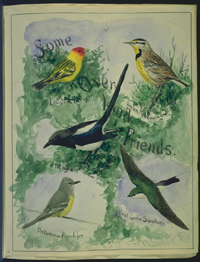April 16, 2010 -- On April 14, Library of Congress Director of Communications Matt Raymond blogged and tweeted (external link) news that Twitter (external link) is donating its digital archive of public tweets to the Library. The response from the world of new media — blogs, tweets and news websites — was immediate and huge.

The twitterverse was aflutter over the news of the Library receiving the donated Twitter digital archive. (Photo Credit: Library of Congress American Memory Collection)
The news was a "trending topic" on Twitter for the rest of the day, eclipsing even Justin Bieber (external link) in popularity. Google listed over 2,000 news articles on the subject, and Go.USA.gov reported that the Library's blog page had over 41,000 clicks (external link), which was more than five times of any other government Uniform Resource Locator. The Internet traffic was so large that the Library blog server temporarily crashed.
Web media outlets of all kinds featured the news, from the New York Times (external link), to the Drudge Report (external link), to PerezHilton.com (external link).
The Library is stressing the research value of the tweet archive in aggregate. The official press release quotes Librarian of Congress James H. Billington noting that "the Twitter digital archive has extraordinary potential for research into our contemporary way of life," and that "anyone who wants to understand how an ever-broadening public is using social media to engage in an ongoing debate regarding social and cultural issues will have need of this material."
An article on the ars technica website (external link) agreed, stating that scholarly research calls for work to "better understand the context of a time and place, to understand the way that all kinds of people thought and lived, and to get away from an older scholarship that privileged the productions of (usually) elite males," and that the Library’s Twitter archive will help meet this need.
